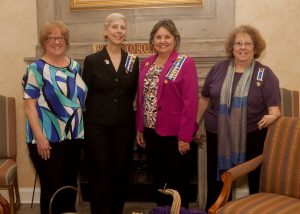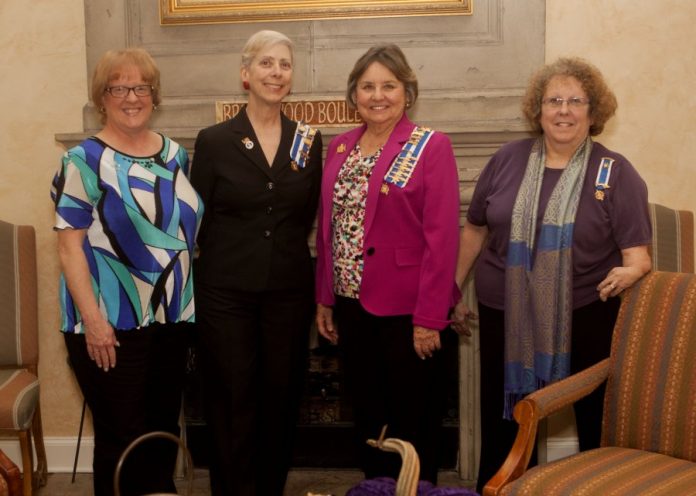
Before she retired from teaching English literature, writing and history in a British school in Mexico City, cosmopolitan Paulette Lollar spent downtime in Flower Mound with her two children and their families.
“I grew up, married and lived in Arizona,” said Paulette. “I’ve been in the DFW area on and off since about 1980.”
Over 35 busy years, she has concluded that being a Texan is the one experience nobody should ever miss. When she discovered she was smitten with the Lone Star State’s charm, she installed a big American flag on a new house seven years ago, and settled in to let the grass grow under her feet a couple of blocks from Flower Mound High School.
Around 10 a.m. every school morning, the institution’s public address system shares the Pledge of Allegiance with the surrounding neighborhood. This is a perfect fit for the Regent of the area’s newest chapter of the Daughters of The American Revolution (DAR).
Instead of fairy tales, Paulette said: “My grandmother [from Georgia] told war stories– about our ancestors who participated in the fight for American independence and, later, the Civil War.”
Laughing, she turned on her best southern belle pronunciation, and said: “Of course, being a good southern lady, Grandma called the latter conflict ‘The War of Northern Aggression.’”
This gave the elderly lady’s daughters and granddaughters a taste for family history. Paulette’s mother and Aunt Sissy went on to become DAR members.
“Our first patriot is Richard Bush, a South Carolina planter, who was too old to fight for independence, but supported the cause by supplying food and forage to the Continental Army,” she explained. “Another ancestor, William Abney, was present at the battle of Yorktown in 1781. That’s where His Majesty and the Redcoats gave up the fight.”
The surrendering general is buried in a Napoleon-worthy tomb in London’s Saint Paul’s church. Paulette noted, with a twinkle in her eye, that the “problem” at Yorktown is notably missing from the impressive list of international military adventures inscribed on the monument. As they say: “You can’t win ‘em all.”
A patriot spy inhabits Paulette’s family woodpile, one John Bruton. Over time other patriots have emerged from the family’s historical fog: soldiers Jacob Fulmer, Jonas Griffin, Sampson Powell, Henry Winkler (no, not The Fonz, but maybe a relation?), James Coleman, and John Stuck. At DAR meetings, she wears a pair of blue and white grosgrain ribbons displaying gold pins engraved with the names of her patriot forbears.
How does a woman develop a taste for this kind of sleuthing?
“Aunt Sissy was the first researcher in my family,” said Paulette. “She jumped in the water after hearing Grandma’s tales, and from those details was able to document her way back to our first four names.”
DAR membership requires a documented genealogy that shows direct lineal descent from a patriot.
“About 10 years ago the lineage bug bit me,” she said. “I used the internet to create a family ‘roadmap,’ then I started to search libraries for supporting documents.”
As these things sometimes do, the project got out of hand.
“The Abneys came to America from Europe,” explained Paulette. “They descended from Crusader knights, who claimed descent from the Frankish kings– the tribal lords who created Gaul– so Julius Caesar could later write for posterity: ‘I came, I saw, I conquered.’”
If you’ve heard the names Clovis or Pepin the Short or Charles Martel or Charlemagne, or dames named Fredegund or Brunhilda, you’ve heard of Paulette’s ancestry. Here’s a connection to current events. Charlemagne’s grandfather, Charles Martel, is famous for pushing Arab invaders, then called Moors, out of what today we call France.
“So, thanks to William Abney, in addition to the DAR, I can belong to several other interesting lineage societies.” Paulette pointed to a wall of framed membership certificates.
“The DAR came into existence on Oct. 11, 1890, and its goal was– and still is– to keep alive pride in our ancestors who loved independence.”
The women’s patriotic society, with membership around 200,000 is national with a three-fold program.
First, is to promote the study of our nation’s history and the preservation of Americana,” she said.
To that end, the DAR owns, restored and maintains Constitution Hall in Washington, D. C. These women don’t think small. The group contributed more than one-million dollars to that restoration, to the Statue of Liberty in New York maintenance and the creation of the World War II Memorial in Washington, D.C.
The DAR Museum contains 30,000 pre-industrial revolution American objects, as well as its archives contain close to 5,000 original early American manuscripts and imprints.
The second goal is to promote education. To that end, the DAR awards $150,000 each year in scholarships and other financial aid for aspiring students. DAR’s members volunteer in literacy programs at many levels and help immigrants prepping for the citizenship exam. To date the group has given away more than 10 million copies of the DAR Manual for Citizenship.
The DAR Library is the second biggest genealogical records repository in the world, so if you can’t make it to the Mormon library in Salt Lake City, try the DAR national headquarters only two blocks from The White House.
The DAR’s third, but not lesser aim, is to promote patriotism and pride in America. It publishes the DAR Magazine and The National Defense News.
What does the DAR do in the Flower Mound area?
“First off, we are a brand new chapter,” said Paulette. “Every year, on Oct. 11, we will do a community service project. This year we helped identify native plants on The Mound. In connection with Veteran’s Day ceremonies we handed out flags, flag codes, pocket size reference booklets of the U.S. Constitution and The Declaration of Independence; and our membership helped at a military veterans’ luncheon in Highland Village.”
Not bad for only 30 women. But that’s not all.
The Flower Mound Chapter sponsors a history essay contest for fourth- through ninth-grade students in local schools. The topic will be The Stamp Act.
We all recall the details of that parliamentary goof; an official stamp was required on every item of paper used by the colonists to prove they paid taxes on, well … everything. Oops! The response was something about “no taxation without representation.” The Stamp Act ignited a revolution that changed history.
Every year the DAR chapter gives its Good Citizen Award to a local student and they also give a local ROTC Award. DAR Project Patriot publicly recognizes local men and women who served in the military. The group will be in the Flower Mound Christmas parade this month.
“Public schools are very receptive to our projects and awards which often allow students without Type-A personalities to have time in the spotlight.” What’s not to like about that?
“The Flower Mound Chapter meets at 10 a.m. on the second Saturday every month from May through September,” said Paulette. “It’s a breakfast meeting at the Bridlewood Golf Club. The cost is $12 per person and includes the meal. Meetings last about two hours.”
New DAR chapters are born from large older chapters.
“We use zip code boundaries, since people like to live in the same general area as the projects,” said Paulette.
The organization is not married to the zip code rule, but it’s easier for members to participate a reasonable distance from home.
“We are the 200th chapter in Texas,” Paulette said. “The Texas organization is more than 18,000 members strong.” The Flower Mound Chapter started with 30 members, though only 12 are required.
The DAR is very different from, say, The League of Women Voters.
“Though they are not partisan, the League is definitely political,” said Paulette. “Their work is to inform voters. The DAR is not politically involved. Its members may be, but that is a private choice not connected with the society. We do not express political leanings or opinions at meetings.”
Membership is open to any woman 18-years or older who can prove lineal descent from an American Revolution patriot.
“We don’t consider race, religion, or ethnicity [as] impediments to membership,” explained Paulette. “In the early years of the 20th century, the nation divided itself those ways, but times have changed for the better, and today our members are a diverse group. We welcome everyone whose ancestor(s) gave to the cause of liberty.”
If all this sounds good, it’s easy to become a member. Contact Paulette for more information at: [email protected], or go to www.texasdar.org.
“There is no better country in the world,” Paulette said. “And, whatever we can do to promote patriotism and education should be a goal for every American.”
Contact Noelle Hood at [email protected].






 GIF.gif)










